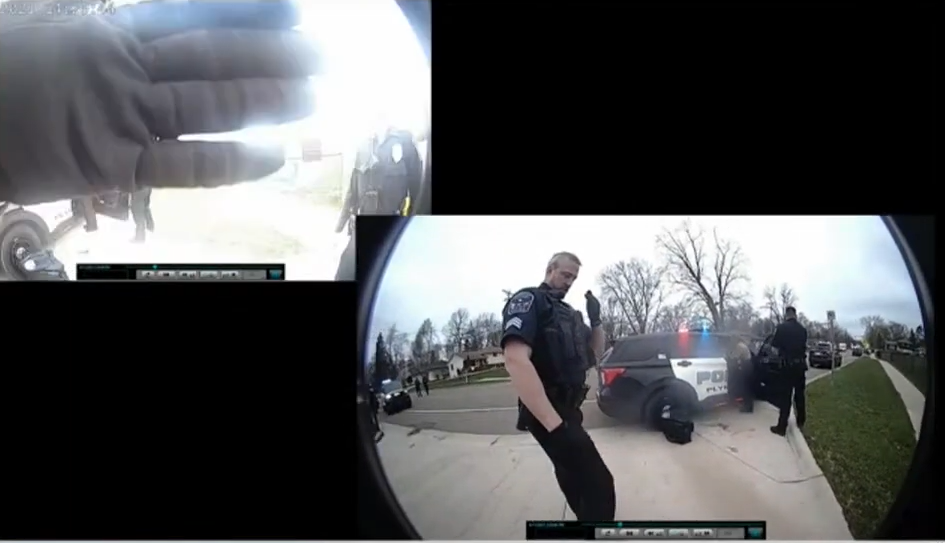‘Can I mute this?’: Potter trial reignites debate on police body camera policies
In the chaotic aftermath of the shooting of Daunte Wright, as officers tried to learn what happened during the traffic stop involving now-convicted former Brooklyn Center Police Officer Kimberly Potter, at least four officers stopped recording their conversations by muting their police body-worn cameras.
Prosecutors played the videos during Potter’s manslaughter trial in December, as officers testified to what they saw as they arrived on scene.
Brooklyn Center Police Officer Alan Salvosa, one of the first officers to arrive after Potter fired a single shot into Daunte Wright’s chest, muted his body camera twice during conversations with a paramedic and fellow police officer.

Then-Sgt. Mychal Johnson, who witnessed the shooting, allowed an officer to mute her body camera during a conversation right after he took Potter’s gun into evidence.
The footage has reignited the debate over policies that allow officers to choose the interactions they record with their body-worn cameras.
Police chiefs say such discretion is necessary because there are times on duty when officers can and should be allowed to have private conversations.
“That may not be… particularly important to the incident or what happens afterwards.”
-Jeff Potts, Minnesota Chiefs of police association
But lawmakers and police reform advocates started calling for changes to those policies last year after a months-long review of high profile cases by 5 INVESTIGATES revealed officers had turned off or muted their body cameras in the middle of critical incidents that led to civil lawsuits or criminal charges.
“If you have nothing to hide, show it,” said Amity Dimock, whose son was killed by Brooklyn Center police in 2019.
Prosecutors determined officers were justified when they shot Kobe Dimock-Heisler after he threatened his grandfather with a knife.
Police said the 21-year-old, who was on the autism spectrum, was unarmed when they first arrived after a 911 call but then he grabbed a knife hidden in the couch.
Video from body-worn cameras showed officers opening fire after their tasers failed to work.
The cameras also captured one of the first responding officers who instructed them to “turn your body-worns off.”
That responding officer was Kimberly Potter.
“People really thought that a body-worn camera was to be kept on from the time an officer goes on shift until the time they come off of shift,” Dimock said. “It’s not okay when they turn off the body cams because you don’t have the whole story.”
The Brooklyn Center Police Department’s policy manual allows officers to temporarily stop or mute recordings on their body-worn cameras to “exchange information with other officers.”
The interim chief for Brooklyn Center Police did not respond to several interview requests.
Jeff Potts, a former Bloomington Police chief and now the executive director of the Minnesota Chiefs of Police Association, defended those policies in an interview with 5 INVESTIGATES.
“There may be conversations about tactics that they did or didn’t use, where they’re… having an exchange of how should we handle this or what should we have done different,” he said. “That may not be… particularly important to the incident and what happens afterwards.”
“It’s not okay when they turn off the body cams because you don’t have the whole story.”
-Amity Dimock
But State Rep. Carlos Mariani, D-St. Paul, said allowing officers to essentially stop recording critical evidence at a scene raises more concerns about transparency.
He first became alarmed by the practice last year when 5 INVESTIGATES obtained footage showing officers stopping the wrong car during a high-speed chase and pulling an innocent family out at gunpoint. After the family pointed out the mistake, every officer on scene either turned off their body-worn camera or muted the mic.
“That particular story was an angle that I hadn’t thought about,” he said. “Whether it’s fair or not, it just… paints a picture of, you know, what are you hiding?”
Mariani said policies like this further strain the trust between police and the public, which is why he’s backing a DFL-led $100 million public safety investment that would provide money to police departments for body camera programs, including “transparency requirements” that include prohibiting altering, erasing or destroying any recording.
Dimock said she will push for legislative approval of those policy changes during the upcoming session slated to start on January 31st.
“You just want answers,” she said. “And when they don’t show you stuff, it’s hard to believe what they say.”